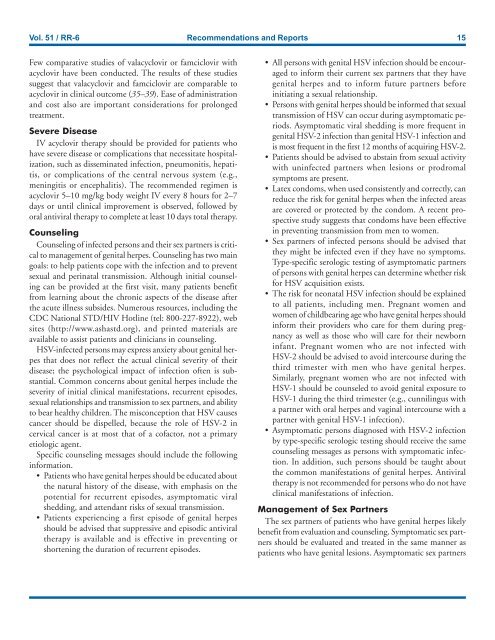Create successful ePaper yourself
Turn your PDF publications into a flip-book with our unique Google optimized e-Paper software.
Vol. 51 / RR-6 Recommendations and Reports 15<br />
Few comparative studies of valacyclovir or famciclovir with<br />
acyclovir have been conducted. The results of these studies<br />
suggest that valacyclovir and famciclovir are comparable to<br />
acyclovir in clinical outcome (35–39). Ease of administration<br />
and cost also are important considerations for prolonged<br />
treatment.<br />
Severe Disease<br />
IV acyclovir therapy should be provided for patients who<br />
have severe disease or complications that necessitate hospitalization,<br />
such as disseminated infection, pneumonitis, hepatitis,<br />
or complications of the central nervous system (e.g.,<br />
meningitis or encephalitis). The recommended regimen is<br />
acyclovir 5–10 mg/kg body weight IV every 8 hours for 2–7<br />
days or until clinical improvement is observed, followed by<br />
oral antiviral therapy to complete at least 10 days total therapy.<br />
Counseling<br />
Counseling of infected persons and their sex partners is critical<br />
to management of genital herpes. Counseling has two main<br />
goals: to help patients cope with the infection and to prevent<br />
sexual and perinatal transmission. Although initial counseling<br />
can be provided at the first visit, many patients benefit<br />
from learning about the chronic aspects of the disease after<br />
the acute illness subsides. Numerous resources, including the<br />
CDC National STD/HIV Hotline (tel: 800-227-8922), web<br />
sites (http://www.ashastd.org), and printed materials are<br />
available to assist patients and clinicians in counseling.<br />
HSV-infected persons may express anxiety about genital herpes<br />
that does not reflect the actual clinical severity of their<br />
disease; the psychological impact of infection often is substantial.<br />
Common concerns about genital herpes include the<br />
severity of initial clinical manifestations, recurrent episodes,<br />
sexual relationships and transmission to sex partners, and ability<br />
to bear healthy children. The misconception that HSV causes<br />
cancer should be dispelled, because the role of HSV-2 in<br />
cervical cancer is at most that of a cofactor, not a primary<br />
etiologic agent.<br />
Specific counseling messages should include the following<br />
information.<br />
Patients who have genital herpes should be educated about<br />
the natural history of the disease, with emphasis on the<br />
potential for recurrent episodes, asymptomatic viral<br />
shedding, and attendant risks of sexual transmission.<br />
Patients experiencing a first episode of genital herpes<br />
should be advised that suppressive and episodic antiviral<br />
therapy is available and is effective in preventing or<br />
shortening the duration of recurrent episodes.<br />
All persons with genital HSV infection should be encouraged<br />
to inform their current sex partners that they have<br />
genital herpes and to inform future partners before<br />
initiating a sexual relationship.<br />
Persons with genital herpes should be informed that sexual<br />
transmission of HSV can occur during asymptomatic periods.<br />
Asymptomatic viral shedding is more frequent in<br />
genital HSV-2 infection than genital HSV-1 infection and<br />
is most frequent in the first 12 months of acquiring HSV-2.<br />
Patients should be advised to abstain from sexual activity<br />
with uninfected partners when lesions or prodromal<br />
symptoms are present.<br />
Latex condoms, when used consistently and correctly, can<br />
reduce the risk for genital herpes when the infected areas<br />
are covered or protected by the condom. A recent prospective<br />
study suggests that condoms have been effective<br />
in preventing transmission from men to women.<br />
Sex partners of infected persons should be advised that<br />
they might be infected even if they have no symptoms.<br />
Type-specific serologic testing of asymptomatic partners<br />
of persons with genital herpes can determine whether risk<br />
for HSV acquisition exists.<br />
The risk for neonatal HSV infection should be explained<br />
to all patients, including men. Pregnant women and<br />
women of childbearing age who have genital herpes should<br />
inform their providers who care for them during pregnancy<br />
as well as those who will care for their newborn<br />
infant. Pregnant women who are not infected with<br />
HSV-2 should be advised to avoid intercourse during the<br />
third trimester with men who have genital herpes.<br />
Similarly, pregnant women who are not infected with<br />
HSV-1 should be counseled to avoid genital exposure to<br />
HSV-1 during the third trimester (e.g., cunnilingus with<br />
a partner with oral herpes and vaginal intercourse with a<br />
partner with genital HSV-1 infection).<br />
Asymptomatic persons diagnosed with HSV-2 infection<br />
by type-specific serologic testing should receive the same<br />
counseling messages as persons with symptomatic infection.<br />
In addition, such persons should be taught about<br />
the common manifestations of genital herpes. Antiviral<br />
therapy is not recommended for persons who do not have<br />
clinical manifestations of infection.<br />
Management of Sex Partners<br />
The sex partners of patients who have genital herpes likely<br />
benefit from evaluation and counseling. Symptomatic sex partners<br />
should be evaluated and treated in the same manner as<br />
patients who have genital lesions. Asymptomatic sex partners


